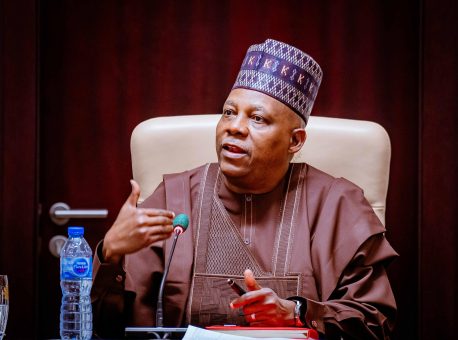Vice President Kashim Shettima has issued a warning about the severe economic consequences of deforestation in Nigeria.
He revealed that over 90% of the nation’s original forest cover has been depleted, with an alarming annual loss of more than 400,000 hectares.
“This is not just an environmental crisis; it is an economic emergency,” Shettima declared on Monday while inaugurating the Nigeria Forest Economy Summit 2025 in Abuja.
The summit, themed “Sustainability of Nigeria’s Forests: Unlocking the $2 billion potentials for economic and financial inclusion,” was organised by the Presidential Committee on Economic and Financial Inclusion (PreCEFI) Secretariat.
READ ALSO: I was public enemy number one in Jonathan’s last four years — VP Shettima
Represented by Deputy Chief of Staff to the President, Ibrahim Hadejia, he emphasised that neglecting forest resources directly impoverishes the nation.
He underscored the immense, yet largely untapped, potential of Nigeria’s forests as a ‘treasure trove of biodiversity, timber, medicinal plants, and other valuable products that underpin agriculture, trade, health, climate resilience, and finance.’
Shettima highlighted global examples, pointing out that Vietnam earns over $15 billion annually from forest exports, Brazil’s Amazon contributes 15% to its GDP from forests alone, and Ethiopia has generated 350,000 jobs through reforestation.
He urged Nigeria to not only replicate these successes but to lead Africa’s forest industrialisation.
He also warned of impending European Union regulations that would forbid imports from lands deforested within five years, stressing that Nigeria risks losing market access if it does not immediately embrace sustainable forest management.
Shettima called for innovation and greater inclusion, suggesting that embedding financial services within forest-based livelihoods would enhance access to credit, savings, insurance, and digital tools.
This, he said, will make 30 million Nigerians who remain financially excluded, particularly women and girls.
He envisioned eco-industrial parks dedicated to bamboo, shea butter, medicinal plants, and carbon verification emerging as key economic drivers, urging attendees to turn trees into trillions and forests into futures.
He expressed hope that the summit would mark a turning point for investing, innovating, and industrialising Nigeria’s forest economy.
Tech solutions and govt partnerships
Also speaking at the summit, Dr Sadiq Sani, Founder and CEO of Netzence Sustainability Limited, pledged to leverage technology to unlock over $2 billion in potential from Nigeria’s forestry sector.
“Netzence is contributing to providing the technology needed to unlock the potential of our $2 billion for Nigerian forestry,” Sani stated.
He elaborated on the company’s core aim to measure greenhouse gas (GHG) emissions using proprietary technology called “CloseCarbon” to facilitate the realisation of carbon credits.
Sani explained that Netzence is developing models based on forest composition and decomposition to accurately assess emissions and calculate potential carbon credit values within forestry environments.
He confirmed active partnerships with the Federal Government, including the Presidency, the Federal Ministry of Livestock Development, and the Ministry of Environment, to analyse greenhouse gas composition and monetise carbon credits.
Nurudeen Zauro, Technical Advisor to the President on Economic and Financial Inclusion and Secretary of PreCEFI, provided insight into the broader government vision, stating that identifying and unlocking untapped opportunities for inclusivity is a key part of President Bola Tinubu’s agenda.
He emphasised that the summit’s essence was to gather various stakeholders, including the Border Community Development Agency and WEN Synergy, to expose the immense economic potential of Nigeria’s forests for sustainable economic and financial inclusion, aligning with the President’s renewed economic agenda.
George Kelly, Executive Secretary of the Border Communities Development Agency, highlighted the vastness of Nigeria’s forest wealth, noting that the country possesses over 10.6 million hectares of natural, planted, and reserve forests.
He projected that properly managed, this could yield more than $2 billion annually, potentially reaching $5.3 billion to $10.5 billion, or even up to $6 billion annually, which could significantly fund several states and alleviate rural poverty.
Kelly indicated that the next step involves consolidating data from all relevant government forestry agencies to facilitate actionable strategies.
READ ALSO: Shettima urges public officials to document stewardship, calls for transparency in governance
Danny Sokari, Chairman of Wen Synergies Nigeria Limited and a fellow of the Nigerian Institute of Architects, underscored the summit’s primary objective.
This, he said, was to raise awareness among stakeholders on how to generate the projected $2 billion from the forest economy and collectively strategise on achieving this goal, particularly by potentially adjusting current approaches to the green agenda.



